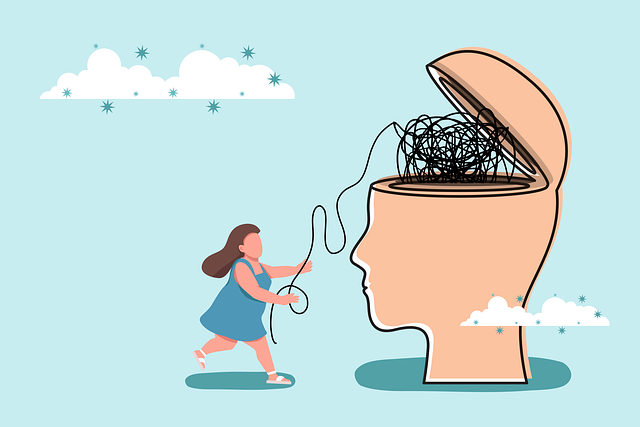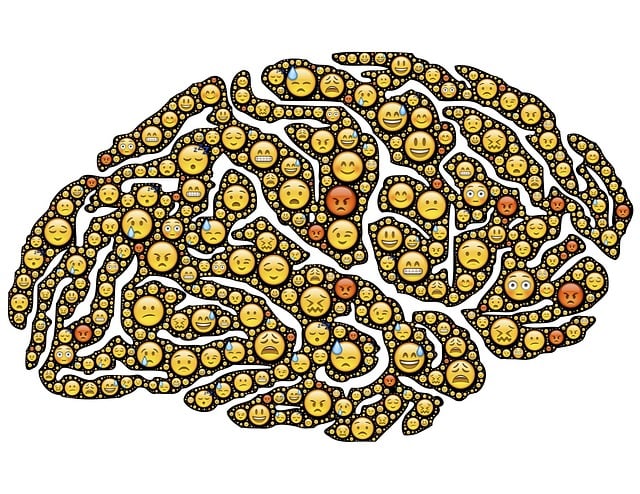Emotional intelligence (EI) is crucial for successful communication in Denver couples, leading to healthier relationships, improved mental wellness, and preventing burnout. In therapy for communication issues, therapists skilled in empathy help partners overcome miscommunication caused by defensive behaviors or unmet needs. Active listening, feeling validation, and non-judgmental expression are encouraged to navigate differences constructively, explore boundaries, and develop coping mechanisms for depression triggers. This process enhances connection, resolves conflicts, and builds resilience through strategic interventions like active listening techniques and mood management strategies in Denver couples therapy sessions.
Emotional intelligence (EQ) is a powerful tool for fostering healthy relationships, especially in the context of Denver couples communication issues therapy. This article delves into the significance of EQ, exploring its profound impact on interpersonal connections. We will guide you through effective strategies to enhance emotional intelligence in therapy sessions, helping couples navigate and resolve communication barriers. By understanding and managing emotions, partners can strengthen their bond, leading to improved satisfaction and a more harmonious relationship.
- Understanding Emotional Intelligence and its Impact on Relationships
- Identifying and Addressing Communication Barriers in Couples Therapy
- Strategies for Enhancing Emotional Intelligence in Denver Couples Therapy Sessions
Understanding Emotional Intelligence and its Impact on Relationships

Emotional intelligence (EI) is a powerful tool that significantly shapes our relationships and overall well-being. It involves recognizing and managing one’s own emotions, as well as understanding and empathizing with others’ feelings. This ability to connect emotionally fosters deeper connections in personal and professional settings, making it an essential aspect of successful Denver couples communication.
In the context of therapy for Denver couples experiencing communication issues, EI plays a pivotal role in building inner strength development. By enhancing their emotional intelligence, partners can navigate conflicts more constructively, improve understanding, and boost mental wellness. This, in turn, helps prevent burnout, as healthy relationship dynamics contribute to a more balanced and fulfilling life.
Identifying and Addressing Communication Barriers in Couples Therapy

In Denver Couples Communication Issues Therapy, identifying and addressing barriers is a crucial step in fostering healthy relationships. Many couples struggle with miscommunication due to defensive behaviors or unmet emotional needs. Therapists skilled in empathy building strategies can help partners recognize these obstacles and create safe spaces for open dialogue. By encouraging active listening, validating feelings, and promoting non-judgmental expression, therapists enable couples to navigate their differences constructively.
Effective communication is not just about what’s said but also how it’s received and interpreted. In the context of mental wellness podcast series production, therapists can guide partners in understanding their unique emotional language and that of their significant other. This process involves exploring personal boundaries, past experiences influencing current interactions, and developing coping mechanisms for managing depression prevention triggers. Through tailored exercises and guided reflections, couples can enhance their connection, resolve conflicts, and build resilience together.
Strategies for Enhancing Emotional Intelligence in Denver Couples Therapy Sessions

In Denver couples therapy sessions, enhancing emotional intelligence involves strategic interventions designed to improve communication and resolve underlying issues. The first step is teaching effective Denver Couples Communication Issues Therapy. This includes active listening techniques, where both partners learn to pay full attention to each other, ensuring every word and emotion is heard and understood. By fostering open dialogue, couples can navigate sensitive topics without defensiveness, fostering a deeper connection.
Additionally, incorporating mood management strategies helps individuals recognize and regulate their emotions during therapy sessions and in their relationships. This might involve identifying triggers for emotional reactions and developing healthy coping mechanisms. In the context of Mental Illness Stigma Reduction Efforts, therapists play a pivotal role in normalizing mental health struggles and encouraging partners to support each other without judgment. Moreover, providing crisis intervention guidance equips couples with tools to manage intense emotions during conflicts, promoting calm discussions and constructive problem-solving.
Emotional intelligence plays a pivotal role in fostering healthy relationships, as highlighted throughout this article. By understanding and addressing communication barriers in Denver couples therapy, individuals can significantly enhance their emotional connections. Through strategic practices tailored to Denver couples communication issues therapy, partners can improve their emotional intelligence, leading to stronger, more fulfilling relationships.














